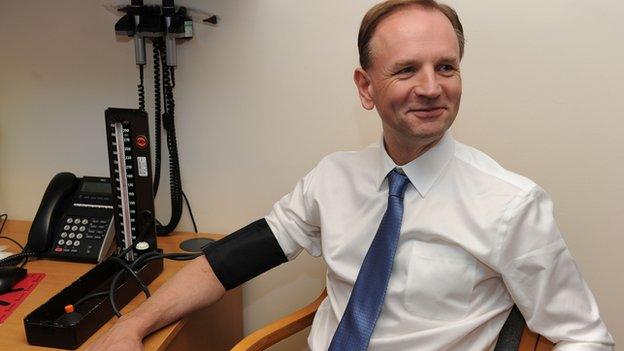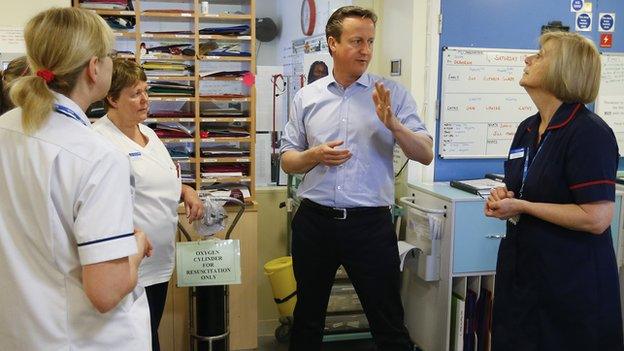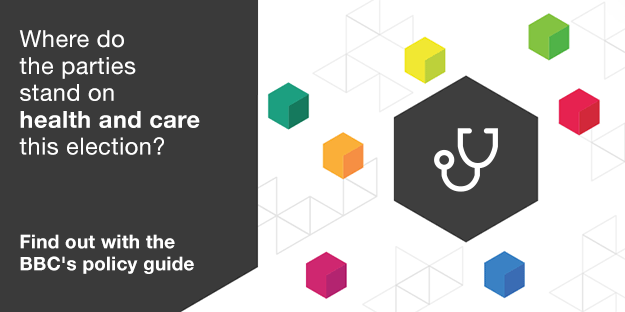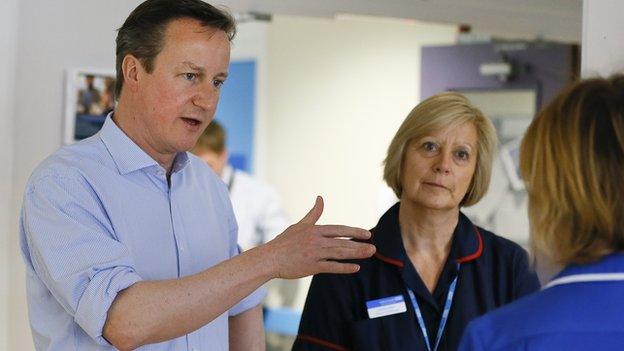The £8bn NHS political row
- Published
- comments

Simon Stevens took over as chief executive of NHS England last April
It's another sign of the power of the head of NHS England Simon Stevens in shaping the political debate over health.
As I wrote over Easter, the £8bn identified by Mr Stevens last autumn as part of his proposed solution to a looming NHS funding gap had generated a mixed response from the leading parties.
Now it has fuelled a heated series of exchanges dominating the campaign debate.
To recap - Simon Stevens and other NHS leaders in England predicted a £30bn gap by the year 2020.
That's the difference between anticipated demand for health care from a rising population and a budget increasing in line with inflation and no more.
More than two thirds, they said, could be covered by efficiency savings, in effect seeing more patients and carrying out more procedures for a set amount of money.
But that still left £8bn above inflation, they argued, which the government of the day would need to stump up in 2020.
That figure would be reached, it was assumed, after a steadily increasing injection of cash over preceding years.
Manifesto pledges
The Liberal Democrats said a little while ago they would find the £8bn if they were in office.
Some of this would be funded by identified tax measures, but the bulk of it would, in the words of Nick Clegg, come from the "proceeds of growth".
In other words the Lib Dems assume they will find the money if the economy is growing normally in the years leading up to 2020.

The Conservatives say they will commit to finding the £8bn in real terms in 2020
Now, after skirting around the subject and dropping various hints, the Conservatives say they will as a manifesto pledge commit to finding the £8bn in real terms in 2020.
Actually it will be "at least" £8bn and could be more, according to party sources.
There are no revenue-raising plans linked to this plan.
The Tory line is that voters can trust them to deliver next time on the back of their record of increasing NHS funding over the last parliament.
They say the NHS budget in England in 2015/16 is more than £7bn higher than in 2010/11 so finding £8bn by the end of the next parliament should not be a problem.
'Funny money'
It's worth noting that the £7bn extra figure was reached over six financial years so over a longer time frame than a single parliament.
So where does that leave Labour? Unlike the other main parties it has not signed up to the Stevens financial numbers.
It is sticking with its pledge to raise NHS funding in England by £2.5bn a year from 2016, in effect making a start on the journey towards £8bn.
Labour points out it has specific tax-raising plans, including the mansion tax, which cover this spending commitment.
It argues this is real money and that the Conservatives and Lib Dems are guilty of promising "funny money" and making unfunded spending pledges.
The debate is in essence between "trust us, we can deliver" with a higher long-term spending pledge and a more cautious and funded shorter-run plan.
As always it will be down to voters to assess the arguments either way.
In the end £8bn could prove too small a government top-up for the NHS.
The efficiency savings talked about look extremely ambitious and may not be achieved.
And of course there could be unpalatable decisions about even deeper cuts in other Whitehall departments or tax rises to sustain cash injections required by the health service.

- Published11 April 2015

- Published2 April 2015
- Published11 March 2015